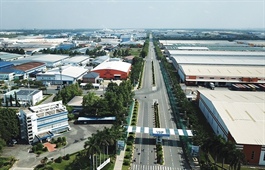EVFTA to have wide impacts on transport businesses
EVFTA to have wide impacts on transport businesses
The EU-Vietnam Free Trade Agreement is having an impact on the local government procurement market, with transport being among the more attractive sectors to EU businesses. Deputy Minister of Transport Le Anh Tuan talked with VIR’s Bich Thuy about the opportunities and the challenges ahead, as well as international lessons the country can draw on.
In line with EU-Vietnam Free Trade Agreement commitments, Vietnam has opened the government procurement market to EU businesses. What opportunities are there for EU contractors?

Deputy Minister of Transport Le Anh Tuan
|
The agreement (EVFTA) includes the highest commitments that a partner has ever made to Vietnam among all the FTAs it signed, and is the first FTA the European Union has concluded with a developing country in the Asia-Pacific.
One of the differences between the new-generation EVFTA and traditional FTAs is that the scope extends to several new fields such as intellectual property, labour, environment, and government procurement. Specifically, under Chapter 9, government procurement covers bidding packages for goods purchases, consulting and non-consulting services, engineering construction, or mixed bidding packages. As the EVFTA took effect from August 1, EU businesses can now join bidding.
In the first five years, EU businesses can join bidding packages for goods purchase, consulting and non-consulting services, with each value upwards of 1.5 million in special drawing rights (SDR); or upwards of SDR40 million ($56.52 million) for engineering construction packages. For the following years, the SDR thresholds are regulated in the EVFTA.
It is worthy to note that the EVFTA does not apply for some bidding packages like constructions in extremely difficult areas and remote and mountainous areas, or islands as regulated by Vietnam. EU bidders are also excluded from the constructions of headquarters of ministries and ministerial agencies.
The EVFTA is expected to bring about both opportunities and challenges for most sectors. How do you foresee its effect on the transport sector and what competition will domestic transport businesses face?
The EVFTA was driven home in the context of strongly developing bilateral ties, especially in the fields of trade and economy. The EU is now one of Vietnam’s leading partners. Bilateral trade has grown by more than 13.7 times from $4.1 billion in 2000 to $56.45 billion in 2019. Vietnam’s exports to the EU rose 14.8 times (from $2.8 billion to $41.54 billion), and imports from the EU ascended over 11.4 times from $1.3 billion to $14.9 billion.
In recent times, COVID-19 has had a negative impact on manufacturing and trade across the globe. However, the EVFTA is forecast to shore up exports and imports, helping to compensate for the global economic downturn. The Ministry of Transport (MoT) understands that all kinds of businesses depend on transport services to approach material sources and distribute goods.
The EVFTA also opens prospects for transport firms in approaching partners who have experience and have attained a high-level of development in the fields of maritime and aviation transport, among others.
Moreover, Vietnam’s tariff cut commitments for transport, machinery, and technology devices to serve logistics activities from the EU provides a chance for domestic logistics firms to buy manufacturing products at more reasonable prices, thus enabling them to reduce costs, improve their technological and internal capacities, as well as reduce outsourcing services.
At the same time, this landmark agreement is expected to create more competition for the Vietnamese economy, for businesses and individual goods and services alike. In fact, this will be a significant challenge, especially in the transport sector because EU companies hold many advantages over their Vietnamese counterparts in terms of competiveness, marketing experience, and better exploitation of FTAs.
Domestic transport businesses should build long-term plans to improve competitiveness, identify successful models to deal with heightened competition, and boost cooperation so as to have powerful businesses capable of linking to transport and logistics service chains to provide multimodal transport services, gradually venturing further into the international market.
How has the MoT prepared for the enforcement of the EVFTA to fulfil the commitments in the field of transport?
The commitments by Vietnam and the EU on trade, services, and investment, including transport, aim to create an open and favourable investment market for the businesses of the two sides. Through the negotiation rounds and legal checks, the MoT has actively worked with the Ministry of Industry and Trade (MoIT) to provide comments and participate in the negotiations on transport-related fields (services, investment, and e-commerce), including maritime transport services, air transport, road transport, and railway, among others.
Basically, the market-opening commitments in the transport sector of the EVFTA are similar to those of the World Trade Organization, we expect few issues in enforcement.
The MoT will continue to collaborate with the MoIT and other relevant agencies in performing the tasks related to the EVFTA. In particular, in Decision No.1175/QD-TTg dated August 4 and Decision No.1201/QD-TTg dated August 6, the MoT is assigned to chair the working group on motor vehicles and spare parts. In addition, the MoT will also increase information programmes for businesses, agencies, and employees.


























